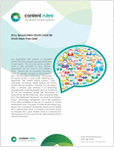 | Any organization that localizes or translates content has three important language assets that it must protect. The first is the source content, which is often controlled by many different departments and can come in many different forms. Second are the translation memories. These are generally managed by the localization team. The final asset is terminology. Terminology, like source content, is quite broad, impacting any department that creates original content. And, importantly, terminology deeply impacts the source content and the translation memories. For this reason, when a company pays attention to its terminology language asset, it gets the greatest return on investment. Yet very few companies manage their terminology. Of those that do, few do it effectively. Most companies suffer from “The Afterthought Syndrome”, as coined by the Gilbane Group. Terminology management, and in fact localization, is too often considered at the end of a product or content development cycle. This paper, co-authored with Venga Corp, argues that a company’s terminology should not be treated like a second-class citizen. A company’s key words should be treasured like a great sweater found at a second-hand clothing shop and worn over and over again because it fits so well and looks great. Request Free! |
